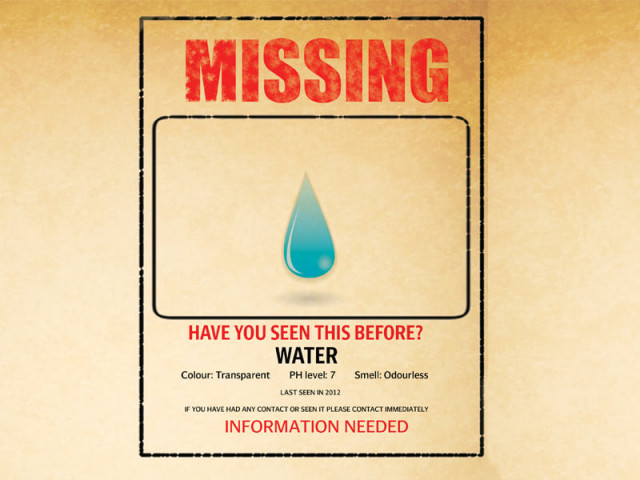Save water to save Pakistan
Country is on the verge of becoming a water-deficient nation.

Save water to save Pakistan
Water is essential for human beings to survive and develop. At the same time, water is a scarce commodity and shortage sometimes results in crisis. Both facts lead to the simple conclusion that lack of water hinders development and a dignified life.
Protecting the quality and availability of clean drinking water resources is becoming the most critical of many environmental challenges for Pakistan. Pakistan has, in essence, exhausted its available water resources and is on the verge of becoming a water-deficit country.
According to the State of Environment Report 2005, in Pakistan, availability of water was 5,000 cubic metres per capita per annum in 1951, which dropped to 1,100 cubic metres in 2007. This estimate reveals that the country will slip below the limit of 1,000 cubic metres from 2012 onwards.
The situation could get worse in areas situated outside the Indus Basin where annual average is already below 1,000 cubic metres per capita, according to the report. It is projected that water availability will be less than 700 cubic metres by 2025, says Pak Strategic Country Environment Assessment 2006.
Reduced and sudden release/blockage of water from India, under unilateral interpretations of Indus Waters Treaty, also worsens the situation. This directly adds to water insecurity, food insecurity, energy insecurity and acuteness of vulnerability of the already vulnerable population.
In Pakistan the attempt to raise living standards of citizens has meant that economic development has largely taken precedence over environmental issues. Unchecked use of hazardous chemicals, vehicle emissions and industrial activity have contributed to a number of environmental and health hazards, chief among them being water pollution. Much of the country suffers from a lack of potable water due to industrial waste and agricultural runoff that contaminates drinking water supplies.
With increasing population and depleting water resources, the country is fast heading towards water shortage and threat of famine. The minimum water requirement to avoid being a “water short country” is 1,000 cubic metres per capita per year.
Fresh storages, therefore, have to be created by building dams to replenish the lost capacity and save the agricultural economy from total disaster, and produce food grains for rapidly increasing population.
About 80% of Punjab has fresh groundwater, with some saline water in the south and in desert areas. In Sindh, less than 30% of groundwater is fresh. Much of the province is underlain by highly brackish water. In Khyber-Pakhtunkhwa, increasing abstraction has led to wells reaching saline layers, and much of Balochistan also has saline groundwater (Pak-SCEA 2006).
The quality of water in federal capital Islamabad and adjacent city Rawalpindi is no better than the rest of the country. A survey carried out by the National Institute of Health (NIH) revealed that 75% of water in Islamabad and 87% in Rawalpindi is unsafe for human consumption.
The statistics show that there is a close link between poor quality of water and health risk. In Pakistan, diarrheal diseases are estimated to kill 200,000 children under the age of five years (548 per day) due to contaminated water. The cost to the economy due to diarrhea is estimated at Rs55-80 billion per year.
Total health costs of water-related mortality and morbidity are estimated at Rs114 billion or approximately 1.81% of GDP (Pak-SCEA 2006).
According to Water Sector Investment Planning Study, Pakistan will face a deficit of 12 million tons in total grain production in 2012-13 which is 31% of projected target. Such large scale deficit cannot be bridged simply by improving farming practices and technology. The irrigation supplies scenario, by the year 2012-13, would be critical, and it will become increasingly disastrous year-by-year thereafter. Hence, there is an urgent need to save water and of more storage dams.
There are no clear guidelines, rules or regulations for groundwater/fresh water abstraction, which results in depletion of ground water resources in the country. In addition to this, provision of safe water to inhabitants seems to be a low priority for successive governments.
Even in presence of policies like National Water Policy (draft), National Drinking Water Policy (draft), National Environment Policy, etc, there is no clear strategy to implement them. Experts believe that rising water conflicts is more of a governance issue. If we want to save Pakistan, then we must save our water resources by resolving our governance issues.
The writer is a consultant at the Sustainable Development Policy Institute Islamabad
Published in The Express Tribune, October 15th, 2012.



















COMMENTS
Comments are moderated and generally will be posted if they are on-topic and not abusive.
For more information, please see our Comments FAQ